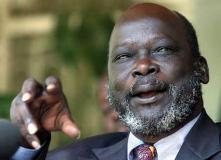Southern rebels would support anti-Khartoum sanctions on Darfur crisis
CAIRO, Sept 30 (AFP) — The head of the Sudan People’s Liberation Movement (SPLM), John Garang, said here Thursday he was not opposed to sanctions on the Sudanese government if such a measure was needed to resolve the Darfur crisis.
 “It can help in terms of what it is intended to do,” Garang told reporters, explaining that sanctions could be a useful tool in bringing an end to the killings in the war-torn Darfur region of western Sudan.
“It can help in terms of what it is intended to do,” Garang told reporters, explaining that sanctions could be a useful tool in bringing an end to the killings in the war-torn Darfur region of western Sudan.
The United Nations estimates that between 30,000 and 50,000 people have died in the 19-month conflict in Darfur pitting government forces and their Arab militia allies against Darfur rebels.
Washington has called it genocide and earlier this month, the UN Security Council passed a resolution threatening sanctions against Sudan’s vital oil industry unless it does more to protect civilians in Darfur.
Sanctions could “save the lives of people who are at risk”, said Garang.
Garang, whose group aims to finalise a final peace deal with Khartoum for southern Sudan, warned the government against brushing off the sanction threats as mere rhetoric, saying “that would be unfortunate”.
But he denied his movement was supporting the rebels in Darfur as the government has alleged.
Sudan has accused the SPLM of aiding the Sudan Liberation Movement (SLM), one of the main rebel groups in Darfur fighting the government’s alleged marginalization of the region and for greater political and economic autonomy.
“There is no basis” for the accusation, Garang argued.
He added that his movement had links with the SLM only through the National Democratic Alliance, an umbrella organization for northern and southern opposition political groups, of which both the SLM and SPLM are members.
He called the crisis in Darfur a “human tragedy”.
The SPLM leader said the government had been arming and funding certain tribes and deploying them to fight the insurgents, mostly from rival tribes. It’s “people against people and not armies against armies”, he explained.
“It’s this policy that can lead to genocide,” Garang warned.
He also said the government had done little to disarm the Arab Janjaweed militias blamed for many of the atrocities against African farmers in the region, including murder, rape and destruction of villages.
“The Janjaweed are on the loose,” he said.
